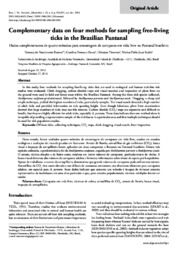Complementary data on four methods for sampling free-living ticks in the Brazilian Pantanal.
Complementary data on four methods for sampling free-living ticks in the Brazilian Pantanal.
Author(s): RAMOS, V. do N.; OSAVA, C. F.; PIOVEZAN, U.; SZABÓ, M. P. J.
Summary: In this study, four methods for sampling free-living ticks that are used in ecological and human tick-bite risk studies were evaluated. Cloth dragging, carbon dioxide traps and visual searches and inspection of plant litter on the ground were used in field and forest areas within the Brazilian Pantanal. Among the three tick species collected, Amblyomma sculptum predominated, followed by Amblyomma parvum and Amblyomma ovale. Dragging, a cheap and simple technique, yielded the highest numbers of ticks, particularly nymphs. The visual search detected a high number of adult ticks and provided information on tick questing height. Even though laborious, plant litter examination showed that large numbers of ticks may use this stratum. Carbon dioxide (CO2) traps are expensive and difficult to handle, but they are highly efficient for adult ticks, especially A. parvum. These data indicate that one method alone is incapable of providing a representative sample of the tick fauna in a particular area and that multiple techniques should be used for tick population studies.
Publication year: 2014
Types of publication: Journal article
Unit: Embrapa Pantanal
Observation
Some of Embrapa's publications are published as ePub files. To read them, use or download one of the following free software options to your computer or mobile device. Android: Google Play Books; IOS: iBooks; Windows and Linux: Calibre.
Access other publications
Access the Agricultural Research Database (BDPA) to consult Embrapa's full library collection and records.
Visit Embrapa Bookstore to purchase books and other publications sold by Embrapa.

